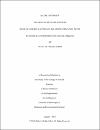ROLE OF AEROBIC BACTERIA IN DOLOMITE FORMATION IN THE EVAPORITIC ENVIRONMENTS OF QATAR SABKHAS
الملخص
Sabkha (salt flats) are extreme evaporitic environments inhabited by a large diversity of halophilic microorganisms. Sabkhas have been studied to understand the microbemineral interactions that lead to the formation of dolomite, a carbonate mineral with the formula CaMg(CO3)2. Dolomite is abundant in ancient sedimentary sequences and constitutes economically important oil and gas reservoirs. However, because it is virtually impossible to form abiotically at Earth’s surface conditions, its mechanism of formation remains unclear and debated.
Most of the previous studies on microbial dolomite formation in evaporitic environments focused on anaerobic sulfate-reducing bacteria. A first goal of this thesis was to clarify if also some aerobic species possess the same ability. Aerobic bacteria were, therefore, isolated from the sediments of a Qatari sabkha –the Dohat Faishakh
sabkha– that are known to contain dolomite. The strains, identified by 16S rRNA gene sequencing, resulted to belong to the genera Bacillus, Staphylococcus, Salinivibrio and, primarily, Virgibacillus. Subsequent experiments conducted in the laboratory under conditions that simulate the sabkha environment showed that Virgibacillus strains are capable of mediating the formation of non-ordered dolomite with up to 48 mol% Mg. This result shows that not only sulfate-reducing bacteria but also aerobic microorganisms may play an important role in dolomite formation in sabkha environments.
To evaluate how the high temperature and salinity that are typical of sabkhas concur and affect the studied biomineralization process, we conducted precipitation experiments at variable temperatures, salinity and Mg+2: Ca+2 ratios. The results showed that temperature
is the most important among the tested factors and that it is positively correlated with the amount of Mg that is incorporated into the carbonate mineral during the biomineralization process.
Finally, to test the hypothesis the extracellular polymeric substances (EPS) play a key role in the mineralization process, we characterized how temperature and salinity affect the production and chemistry of EPS and compared EPS of bacterial strains capable and noncapable of mediating mineral formation. We found that high temperatures (i.e., 40°C) cause microbes to produce EPS that contain a large proportion of carbohydrates. This finding is consistent with the hypothesis that carboxyl groups play a crucial role in the formation of dolomite at low temperature. We have also reinforced this conclusion performing experiments with organic molecules that simulate different types of natural EPS.
Together, our results provide new insights into microbial diversity and biomineralization
mechanisms that lead to the formation of dolomite in sabkha environments.
DOI/handle
http://hdl.handle.net/10576/11329المجموعات
- العلوم البيولوجية والبيئية [111 items ]


